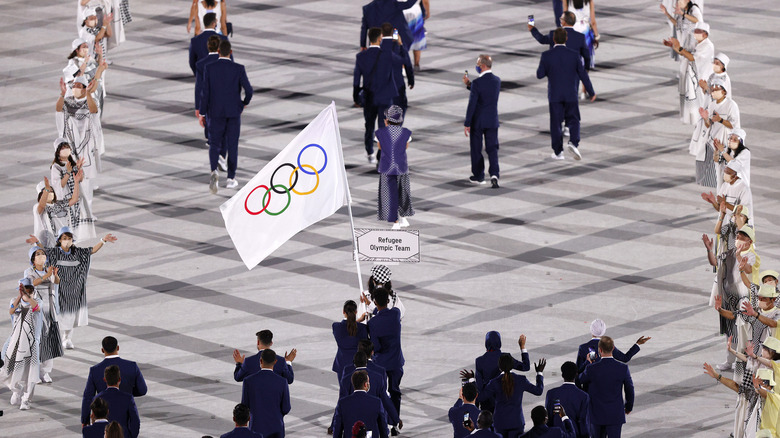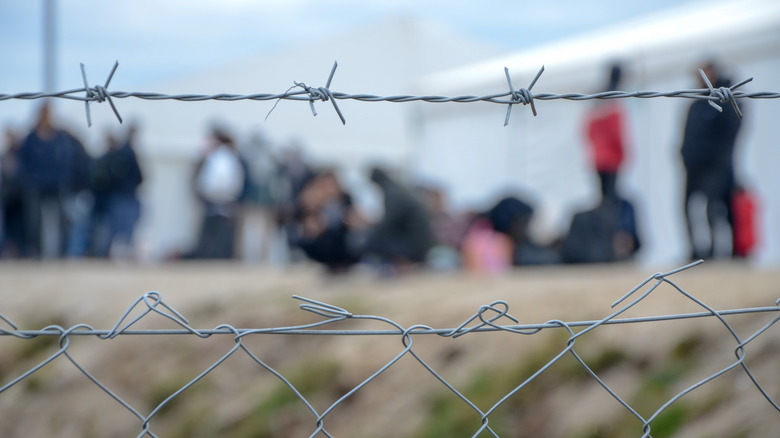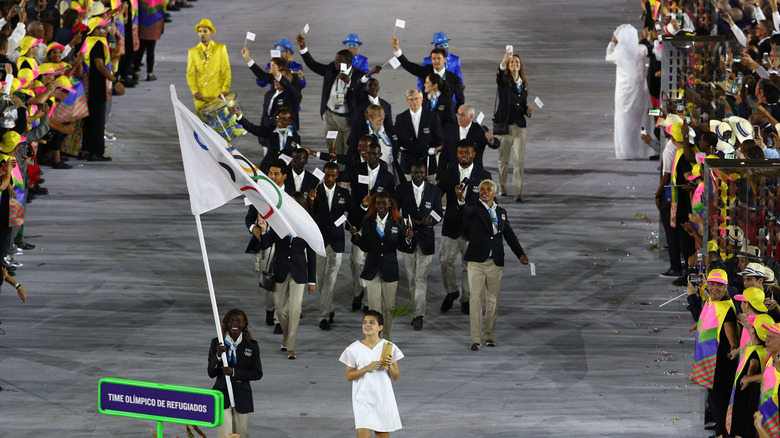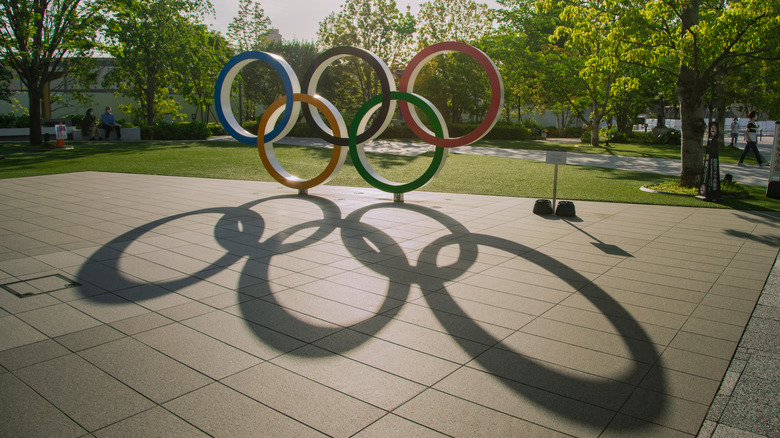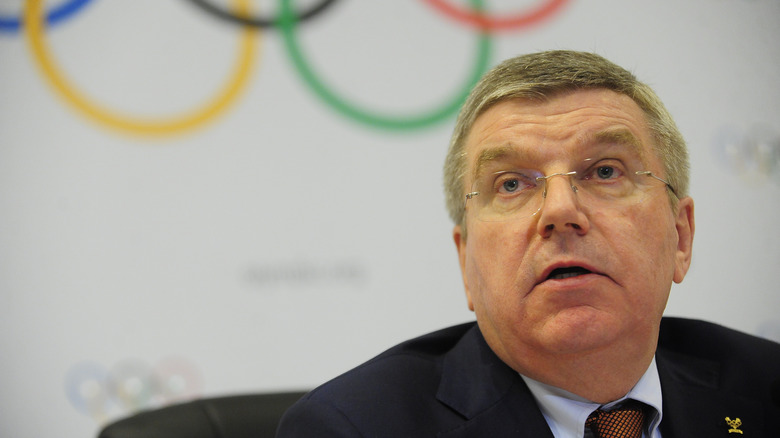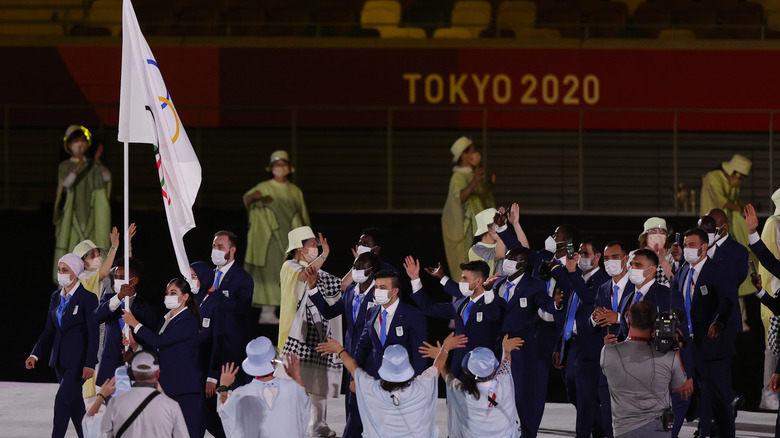The Untold Truth Of The Refugee Olympic Team
To be a refugee is to be a person without a country. So for world-class athletes who find themselves in this unfortunate situation, competing in the Olympics has traditionally been a longed-for impossibility. With the games still based on 20th-century notions of nationalistic pride that the world will hopefully one day grow out of, what flag would such people wave at the opening ceremony? What colors would their uniforms be? Where would they take their medals after the games?
In 2016, the International Olympic Committee (IOC) announced that it had come up with a solution. Comprised of people who fled life-threatening situations in their home countries, the Refugee Olympic Team made its debut at the Summer Olympics in Rio de Janeiro, Brazil. IOC President Thomas Bach said the team stood as a "symbol of hope for all refugees in the world" and served to raise awareness about the global refugee crisis. "It is also a signal to the international community that refugees are our fellow human beings and are an enrichment to society."
The Refugee Olympic Team was meant to be a one-off event, but the IOC brought it back for the Tokyo Olympics, which NBC News reported "kicked off like no other" thanks to coronavirus-related constraints on July 23, 2021. Now that the games will be welcoming its second Refugee Olympic Team, let's take a look into why the team was created, how it functions, and the criticism it has received by some of the very refugees who have trained for it.
The primary drivers of the global refugee crisis
Forced displacement due to conflict and other life-threatening factors is nothing new. However, according to the UN Refugee Agency (UNHCR), the refugee crisis became markedly worse in the 2010s. The agency's data show that the number of displaced people globally hovered somewhere around 40 million in the 1990s and the first decade of the 21st century. But early on in the 2010s, that number began to rise, and it has not seen a drop since. The UNHCR's estimate of forcibly displaced people in 2019 was nearly 80 million.
More than two thirds of those people came from just five countries that have been mired in conflict for years: Syria, Venezuela, Afghanistan, South Sudan, and Myanmar. And while factions of citizens in affluent countries in North America and western Europe voice fear of refugees flooding across their borders, the majority of refugees end up in neighboring countries, such as Turkey, Colombia, Pakistan, and Uganda. (Germany rounded out the top five host nations.) The UNHCR report noted that the ever-worsening effects of climate change, especially disaster-level events, are exacerbating the refugee crisis the world over.
Each year, refugees make up a larger section of the global population, so on its surface, an Olympic team allowing them to participate seems like a compassionate gesture toward a desperately underrepresented group of people. But before we go patting the IOC executives on the backs for their world-class altruism, let's take a look at how the first Refugee Olympic Team fared and what its critics have to say about it.
The inaugural Refugee Olympic Team
Ten months after the announcement of the team's inception, the 10 members of the Refugee Olympic Team were competing in Brazil. IOC President Bach proclaimed that the athletes — who had been displaced from Syria, South Sudan, Ethiopia, and the Democratic Republic of the Congo — were a "symbol of hope for all the refugees in our world." The team marched and waved the Olympic flag alongside the other competing country's athletes in the opening ceremony. The team had been trained by chef de mission Tegla Loroupe, a legendary runner and two-time New York Marathon winner from Kenya.
When it decided to bring the team back for the 2020 Tokyo Olympics, the IOC cited the "success" of the team at the Rio Olympics. (The Refugee Olympic Team did not win any medals in Rio.) Some athletes who trained and competed with the team, however, said they were not the recipients of the benefits of that success. While the Refugee Olympic Team was ostensibly meant to foster hope for displaced people the world over, some of the very athletes on Loroupe's team training for Tokyo 2020 said they didn't see much hope in their own situations.
The Refugee Olympic Team didn't offer these athletes hope
According to Time magazine, six athletes training for a chance to be on the refugee team have defected from the training center that was their only chance at competing in the Tokyo Olympics. The runners were training at the Tegla Loroupe Peace Foundation Training Center in Nairobi, Kenya. Founded by the famous runner, the center was the impetus for the creation of the Refugee Olympic Team.
But instead of hope, athletes like South Sudanese runner and refugee Dominic Lokinyomo Lobalu found exploitation. He and the other runners lived in dormitories, weren't given the prize money they won in races, and were paid less than $50 a month for expenses. If they had any complaints, they were told they could return to the even more hopeless situations from which they came. "They would say, 'If you don't like the place, pack your bag and go back to [the refugee camp],'" said Gai John Nyang, who defected from Loroupe's training center in 2017.
Lobalu defected after a race in Switzerland in 2019, stayed in the country, and has been training and competing there since. Despite coming in second by one one-thousandth of a second in a race in June 2021, he was not able to compete in the Tokyo Olympics. He is not a Swiss citizen, and he forfeited his chance to compete as a refugee when he left Loroupe's center.
Is the Refugee Olympic Team a PR stunt?
Although Lobalu lost his chance at Olympic gold this year, he says he now at least receives payment for his work through prize money and endorsements. So, if potential members of the Refugee Olympic Team were able to find better lives by defecting rather than staying in the program, what does that say about the IOC's lofty statements about hope and awareness? Runners like Lobalu and Nyang merely went from one exploitative situation to another. It may well be that the much applauded "success" of the Refugee Olympic Team really lay in its ability to clean up the IOC's image, one plagued by doping scandals and outrageous cost overruns for host cities. The Economist reports that host cities see average budget overruns of 172%.
The difficulty these refugee athletes experienced trying to reap the benefits of their talent is put into stark relief in light of the ease that other participants have in doing so, even after breaking the rules. As USA Today reports, some Olympic athletes from Russia are still allowed to compete in Tokyo, despite that country's well-documented doping scandal. So while Russia engages in a state-run doping program, it can still use its influence to get 335 Russian athletes into the Tokyo Olympics, while refugees are told to be happy with room, board, and a paltry monthly stipend, or else they're not allowed to compete. The hopeful words of IOC President Bach (pictured above) ring hollow when contrasted with his organization's actions.
The 2021 Refugee Olympic Team in Tokyo
As the IOC tells it, its Olympic Solidarity program provided scholarships for 56 refugee athletes to train in hopes of making the refugee team. "The IOC will continue to support the refugee athletes even after the Olympic Games Tokyo 2020," the committee said. But these are both things that Lobalu and Nyang said they didn't receive. Tegla Loroupe's deputy chef de mission Olivier Niamkey told Time that the athletes received $1,500 monthly payments, but the defectors told a different story. Nyang regularly had to borrow money on top of the $46 monthly stipend he received. He and the other defectors complained of being denied the chance to create their own lives outside of the refugee team training program.
Still, Loroupe found enough refugee athletes to grow the team's numbers for the Tokyo Olympics. A total of 29 athletes from 11 countries of origin and 13 host countries will compete in 12 sports, including taekwondo, judo, karate, cycling, wrestling, athletics, swimming, and more. Hopefully the IOC will finally come through with the promises it has made to these world-class athletes, rather than giving itself a nice PR pat on the back.
